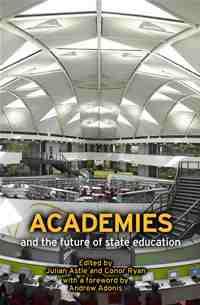
To London today for the launch of a new volume of essays on academies, which I co-edited for Centreforum with Julian Astle. A pleasing consensus is emerging on the value of academies, and the launch was attended by Andrew Adonis, Michael Gove and David Laws. Michael Wilshaw also recounted his experiences at Mossbourne in Hackney.
What the new volume demonstrates is not just the extent to which different academies have used a combination of their dynamic leadership and independence to innovate on everything from the curriculum to all-through schools, but also the way that the idea of academies has become a mainstream position for all the parties (at least at leadership level). With the government committed to 400 academies, and the Tories and Liberals seeking to outflank them (albeit with exaggerated differences in emphasis) academies are clearly here to stay.
In the book, Paul Marshall, whose work with Ark has helped develop the multiple mini-school model for academies, argues for primary academies, while Julian Astle goes beyond the prevailing consensus to argue for profit-making providers. But what it perhaps most illuminating is the testimony of the various heads who have battled against the odds to disprove the doubters. You can read the book and access the media coverage here.
1 comment:
I attended the Centre Forum launch of this book on Academies. It was a stimulating and interesting occasion and the case for Academies was well made.
As National Secretary for the British Association of Teachers of the Deaf, I have one concern that has been raised by a number of Teacher of the Deaf colleagues who work within specialist support services with deaf pupils. Their concerns relate specifically to those deaf children who, when being educated in LA schools, receive specialist support from peripatetic teachers on a regular basis to facilitate their inclusion in the school. These specialist support teachers both teach the pupils and advise and support teaching assistants, classroom teachers and other staff as necessary - sometimes visiting weekly or even more frequently.
Deaf children constitute a low incidence group with unpredictable distribution. This is why LAs do not delegate funding to schools for the support of such pupils - rather the support is provided in a preventative way or at School Action Plus, free at the point of delivery. I am aware of one LA where there is an agreement between the Academy and the LA that this will continue to happen. Our concern, however, is that Academies will not choose to provide the often expensive support to deaf students who are not statemented in the same way as they would have been supported in an LA school. Are there any safeguards to ensure that this support is provided? One colleague has told us that, in one case, ToDs have not been not bought in since the school acquired Academy status - whereas previously they supported the deaf pupils. Furthermore they are not even invited in to give their specialist advice in relation to the complex issue of applying for reasonable adjustments for examinations because payment would be required. We hope that this is not a common occurrence but would welcome safeguards for these children with low incidence special needs.
One other concern is that as the number of Academies increase the amount of resources remaining with LAs for their central funds will inevitably diminish - what safeguards are in place to ensure that vital low incidence specialist support services will be protected so as to be able to provide their specialist support and advice and also the funding needed for that small number of pupils whose needs can only be met in out of county provision?
Post a Comment